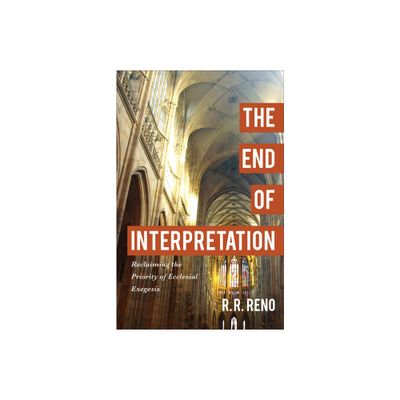Home
the End of Interpretation: Reclaiming Priority Ecclesial Exegesis
Loading Inventory...
Barnes and Noble
the End of Interpretation: Reclaiming Priority Ecclesial Exegesis
Current price: $22.99


Barnes and Noble
the End of Interpretation: Reclaiming Priority Ecclesial Exegesis
Current price: $22.99
Loading Inventory...
Size: Paperback
*Product Information may vary - to confirm product availability, pricing, and additional information please contact Barnes and Noble
Those who wish to interpret and understand the Bible face a fundamental question: How do I interpret Scripture faithfully? Theological interpretation is an approach that has received much attention in recent years, and R. R. Reno is a leading practitioner and proponent of this approach.
In
The End of Interpretation
, Reno's first full statement on the topic, he argues that Scripture is interpreted correctly only when it is read through the lens of creedal orthodoxythat is, through the apostolic faith. The principle of accordance between doctrine and Scripture is of first importance for solid Christian interpretation.
Reno provides a simple explanation of this multifaceted approach. He wrestles with what makes interpretation "theological" and provides two historical case studies, discussing Origen and the Reformation debate over justification. He then demonstrates what theological interpretation looks like in practice, reflecting on Genesis 1, John 17, and 1 Corinthians. Reno's insights will benefit serious readers who seek to interpret Scripture faithfully.
In
The End of Interpretation
, Reno's first full statement on the topic, he argues that Scripture is interpreted correctly only when it is read through the lens of creedal orthodoxythat is, through the apostolic faith. The principle of accordance between doctrine and Scripture is of first importance for solid Christian interpretation.
Reno provides a simple explanation of this multifaceted approach. He wrestles with what makes interpretation "theological" and provides two historical case studies, discussing Origen and the Reformation debate over justification. He then demonstrates what theological interpretation looks like in practice, reflecting on Genesis 1, John 17, and 1 Corinthians. Reno's insights will benefit serious readers who seek to interpret Scripture faithfully.

















